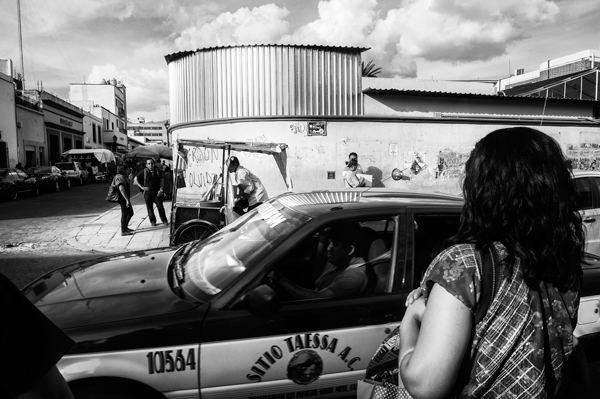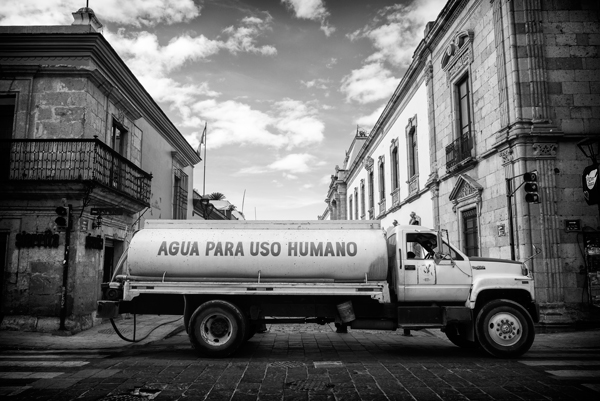
Each time I go to Oaxaca I lower my expectations.
Once, I hoped to speak Spanish as fluently as I do English, to be able to joke and to discuss and to engage. Now, I work at making myself understood and trying to grab the gist of what others tell me.
Once, I had a vision of assembling a collection of great photographs, like those of my late friend and teacher, Mary Ellen. Now, I am satisfied if the computer I carry up the stairs to my homeward-bound plane holds one or two frames that make me, and maybe her, proud.
Once, I thought I might merge my American life and my Mexican life, becoming as a result a more international, perhaps even bicultural person. Now, I recognize how American I am and that, regardless of how much time I spend in Oaxaca, I am not Mexican at all. I view the world in a distinctly American way, for better or for worse. As an example, despite all the negativity of this election year and the disheartening vein of racism, hatred and fear opened by the Trump candidacy, I see a society of opportunity built on principles of fairness and justice (regardless of how often they are unachieved). This outlook is un-Mexican. Even as Mexico advances economically and socially, it remains far short of being a nation of opportunity. Fairness and justice are foreign concepts in a country where the wealthy and the criminal benefit from an endemic infection of corruption and impunity at the expense of the poor and the powerless. Many Mexicans, especially the poor, accept this status quo. Ni modo. I am too American to do so. I will always be apart – ajeno.
Once, I believed, with great naivety, that I and the people I photograph, many of them poor, most of them single mothers, all of them hard-working and dedicated to their children, had much in common. Now, though, I see how wrong I was. Other than our shared humanity – and I cannot discount the immense importance of the human connection I feel to them – we have nothing in common. I live in affluence, where water flows from the shower head in a gushing stream, where the airport parking garage is packed with pricey German cars, where the food is clean, where we all have bathrooms and refrigerators and where we don’t have to sleep in the same bed as our children because we have more than one bed, more than one bedroom, more than almost everyone in the world. They, these good people, these folks – to use Obama’s word – who welcome me into their one-room homes, have none of that. None. Of. That. Although I see their world, I cannot imagine living in it. They neither see my world nor can imagine living in it. Now, I look to share the moment with them, to do what little I can to make a difference. And then I leave.
I returned from Oaxaca last night after 11 days there.
Less and less. That’s what I expect. The desire for more remains, but I don’t expect it to happen. I’m OK with this. I don’t feel as if I am settling. It feels realistic and possible, and therefore it satisfies.


Tim, I can relate very much to what you write. I too feel much the same way as you do. We are American, for the worse and the better of it. I admire your work. I hope our paths cross again in Oaxaca.
Tim este articulo es una obra maestra, es honesto, humilde y escrito con el corazon desnudo. Has logrado describir claramente esta realidad de Mexico que tambien es ajena aun para muchos mexicanos.
Hello Tim,
I like to address you like that “Tim” because after reading your experience in Oaxaca there is with me a feeling of partnership, more than an acknowledge of aloofness.
I’m a Northern Mexican, more closer to US than to Oaxaca, and also I’m trying seriously to get a grip with my English, not for the language itself, but for get closer to our neighbors, to learn from a so different culture how to overcome our vices and wickedness.
Lowing expectations seems today the tendency, and I’m not talking only about Oaxaca. Trump is lowering those as he is rising walls, but that is not my point.
Let me share with you that I also try to merge my “Mexicanity” with my “Americanity” and after some years I realize that it was irrelevant:
What I merged successfully was my “liferty” to cope with differences and embrace similarities: An entire nation is not defined by a single man nor a single region nor a single phenomenon, no matter how powerful it would be.
I’m delighted to read you found yourself more American as you explore the darkest waters of the Mexican tragedy, let me be clear: that’s not Oaxaca nor Mexico as a whole, I think nobody should be identified with “that” Oaxaca, with “that” Mexico.
There is no way to admit to share a misery environment as a way of living, and I’m not agree to admit that’s the Mexican way to live, it has to be another option, and if you call it “American thinking”, let it be welcomed!
The desire for better: that’s the Mexican way, and if we are not seeing that, well, that is the desire that remains, and there is an old Mexican proverb, difficult to translate, here I go: “Roads and paths may vanish, but the willing to walk remains”
Let’s seek for a path, let’s walk a road, as walking constructs such a way.
Could you make me a courtesy? How do you translate to Spanish that phrase in bold “I am settling” it is escaping form my poor English to grasp it’s meaning.
No hurries, thanks in advance!